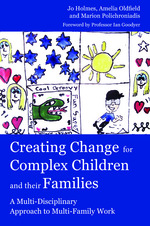 Jo Holmes is co-author of the new book Creating Change for Complex Children and their Families, with Amelia Oldfield and Marion Polichroniadis.
Jo Holmes is co-author of the new book Creating Change for Complex Children and their Families, with Amelia Oldfield and Marion Polichroniadis.
Here, Jo talks about her work at the Croft Child and Family Unit in Cambridge, UK, which forms the basis for the model of a multi-disciplinary approach to multi-family work described in the book.
Both of my parents worked in education and apparently from an early age I declared an interest in “helping children with problems”. I had trained in medicine at Southampton University, UK, and was undertaking postgraduate training as a general practitioner when a placement in psychiatry caused me to change my career direction. For me, understanding and working with people on their mental health seemed the underpinning to all aspects of well-being. During my training with adults and older people with mental health problems, I was always fascinated by people’s childhood experiences and when I eventually started working in child and adolescent services I realised that this was where my passion lay.
For over a decade I have been the medical director of the Croft Child and Family Unit in Cambridge, UK. This is a specialist in-patient unit admitting children with severe and complex mental health problems and their families. Children are referred by community clinics across the Eastern region of England. The children are under 13 and usually in the primary stage of education. The children who are referred have a very wide range of difficulties, from children with severe eating disorders such as anorexia nervosa, to children with autism spectrum disorders with highly challenging behaviour. However, whatever their particular challenges, all the children come into an in-patient unit because their development or mental well-being is compromised and community treatment has not been sufficient to meet their needs. Often the children we work with have been excluded from mainstream schools because of the severity of their difficulties. For the same reason the children are often unable to access ordinary community activities, and in extreme situations families can become virtually house-bound because they cannot manage their child in the community. Parents often talk about losing contact with friends and even family due to their situation.
In addition to their own inherent difficulties, many of the children using our service also have family members (often parents) struggling with their own emotional well-being – possibly as a result of trying to care for a child with severe needs or because of damaging events in their own background or both. The combination of a child with severe emotional and behavioural problems in a family under great stress can lead to breakdown in ordinary family life, with daily routines lost and families fire-fighting one crisis after another. When families are faced with such severe difficulties, it is easy to see that standard community interventions or support is unlikely to be able to reverse the compounding disadvantage that these children face.
 So what does the unit hope to offer to these children and families in crisis? The fundamental aim is to provide a containing and therapeutic environment where children and parents feel safe and understood. It is vital that we can manage the most challenging behaviour to reassure both child and family that we will be able to keep them safe and that we can help them to regain some of their ordinary family life. Through individual and group work we aim to get to know a child really well in order to identify their strengths as well as their weaknesses. We also work closely with parents and have an opportunity to see how family relationships work on a day-to-day basis. We use the information we gain from these close observations to establish a holistic, integrated understanding of all the important factors driving the child’s problems and then use this to plan interventions.
So what does the unit hope to offer to these children and families in crisis? The fundamental aim is to provide a containing and therapeutic environment where children and parents feel safe and understood. It is vital that we can manage the most challenging behaviour to reassure both child and family that we will be able to keep them safe and that we can help them to regain some of their ordinary family life. Through individual and group work we aim to get to know a child really well in order to identify their strengths as well as their weaknesses. We also work closely with parents and have an opportunity to see how family relationships work on a day-to-day basis. We use the information we gain from these close observations to establish a holistic, integrated understanding of all the important factors driving the child’s problems and then use this to plan interventions.
A very important and unique part of the Croft approach is to admit children with parents as we believe that young children (especially those with severe emotional and behavioural problems) should not be separated from their families. We also think that children cannot be holistically assessed without seeing them in their family context, and our experience is that some of the most useful therapeutic work we do is directly with parents helping them to re-establish their parental authority and rebuild damaged relationships. Another important and unique aspect of the therapeutic experience for families at the unit is living side-by-side with other families facing similarly severe problems. This creates a community of families learning new skills together and supporting each other. Before admission families often tell us of how isolated they feel as if they are the only ones with children with difficulties. At the end of their stay parents say how talking with fellow parents and sharing experiences can lessen this sense of isolation and provide a sense of hope as families leaving the programme encourage the newcomers to stick with it and demonstrate that improvements are possible.
As we offer a number of different therapeutic approaches, including behavioural support, music therapy, family therapy, medication and more, the multi-disciplinary team have to work closely together to ensure that all the interventions we offer are complementary and work together towards the overall aim of the admission. So for example, the music therapist would need to discuss with the unit teacher the timings for therapeutic sessions to ensure that education sessions were not disrupted negatively, and the family therapist would discuss his work with the key nurse to ensure that the parents were getting coherent advice about the rational for any changes to their parenting approach.
So does it work? The team would not claim to cure all the problems facing the delightful but complex children we work with – and the intensity of our approach does not suit all families – but those who do engage fully with the therapeutic programme tell us that their weeks on the unit can sometimes be life-changing. For each family the benefit is unique and individual; for one child it might be returning to school after a break of over a year; for another family it might be establishing contact with an estranged parent; for another it might be the experience of professionals hearing and believing their family experience.
For some children the difference is obvious; a child suffering from anorexia leaving the unit at a healthy weight and able to go back to school and participate in their favourite dance lessons; for another child the ability to sit and concentrate for 15 minutes or more on their lessons when they could barely sit for 30 seconds when they first arrived. For some families the changes are more subtle and may only emerge after their in-patient stay. We hold an annual fun day when children and families are invited back to the unit for a barbeque and picnic and a chance to play games and meet up with friends they had stayed with on the unit. On this day parents often tell us about the changes they have seen since returning home: children managing to eat a family meal without fighting, or being able to go swimming for the first time in years. These are the stories that encourage us all as we work with children and families struggling to cope with multiple areas of difficulty.
Units like the Croft are rare – in England there are only seven such units and some geographical regions do not have a unit at all. The units have finite capacity and there is no doubt that many children with complex needs who could benefit from our services are not accessing the service. The children we see are often children who are involved with support services in education, health and social care, and multi-agency liaison both before and after admission is vital to ensure that all the professionals involved with a family are engaged with the unit, contributing to the assessment and ready to implement the recommendations at discharge so that children and families can maintain the momentum for positive change.
Jo Holmes has been the Medical Director of the Croft Child and Family Unit for over ten years. She undertakes specialist assessments of children relating to autism spectrum disorders, attachment disorders and other conditions. She also trains child psychiatrists and other mental health professionals.
Using detailed case studies from the Croft and Family Unit to illustrate their model, Creating Change for Complex Children and their Families focuses on the needs of children with a wide range of developmental, emotional and behavioural difficulties, and explores the complicated interactions between these children, their families and their communities.
The authors examine how to integrate a range of therapeutic interventions and how to use the powerful relationships that develop between professionals and families to enable positive, lasting changes.
Click below for more info about the book.
Copyright © Jessica Kingsley Publishers 2011.
I had the pleasure of meeting Jo at a conference in Cambridge where psychologists and Music Therapists shared their ideas, and was impressed by her warmth, humour and expertise. Amelia is also someone I know quite well as a fellow Music Therapist sharing my passion for working with people on the autistic spectrum. I therefore anticpate that this book will be well worth reading, and that the Croft’s example will provide an excellent model for other units – if only we had something like that in Exeter! There is no NHS funded music therapy for children here, I work in an NHS Arts Therapies service for adults with mental health problems, some of whom also have learning disabilities and/or autistic spectrum conditions.